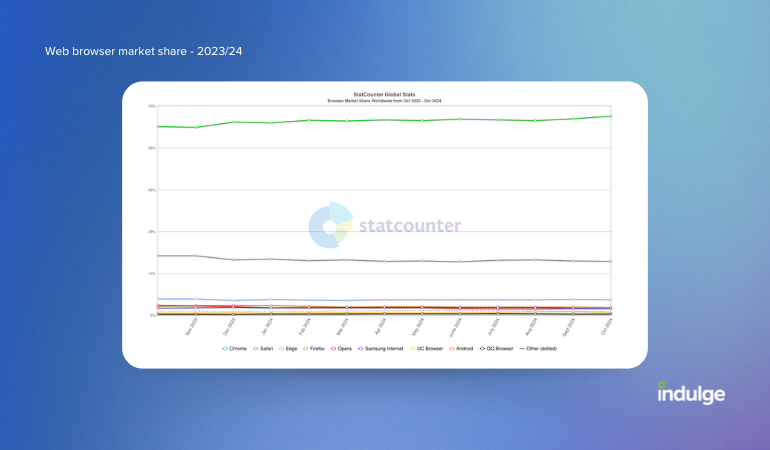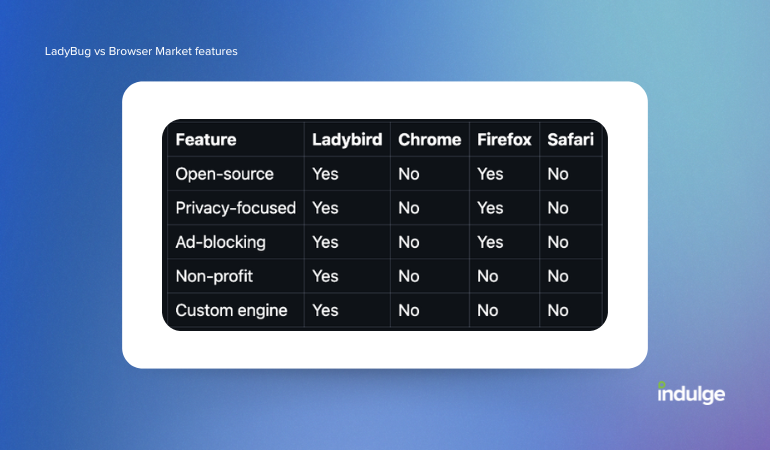The Web Browser Market
The web browser market is currently dominated by Chrome (65% share), with Safari coming in second (18% share). Behind this lie a few smaller players, like Edge, Firefox, Samsung and Opera.

Source: Statcounter Global Stats
The market has seen little change since 2020, raising important questions about competition, innovation, and security within the browser ecosystem.
During the early 2000s, Internet Explorer (owned by Microsoft) was the market dominator, holding a 95% market share during its peak in 2002/2003. Their reign continued until Chrome was released in 2008, offering faster speeds, frequent updates, and better web standards. Users quickly began the migration, leading to what is now called the ‘first browser war’.
Microsoft's main mistakes were not updating IE often enough, having only four updates in ten years compared to Chrome’s 70, and ignoring key web standards, causing many sites to look or work poorly on IE.
IE’s decline was a result of becoming complacent, thinking it didn’t need to evolve due to its strong market position.
Now, Chrome finds itself in a similarly dominant position, with Google asserting that its market share is justified by superior quality. But as history shows, dominance feeds vulnerability.
The Role of Rendering Engines
Every web browser is built on a rendering engine, responsible for interpreting HTML, CSS, and JavaScript to display web pages.
Currently, there are three primary rendering engines in use:
- Blink: Developed by Google, Blink powers Chrome and other Chromium-based browsers like Microsoft Edge and Opera.
- WebKit: Originally created by Apple, WebKit is the engine behind Safari.
- Gecko: Mozilla's Gecko powers Firefox.
Blink is the leading rendering engine in the market, used by the most popular web browsers. It holds about a 79% market share.
The Challenge for Web Developers
Generally, rendering engines are designed to be versatile, however, each is unique in design and functionality.
This diversity means web developers often face challenges ensuring that a website looks and behaves consistently across different browsers.
Impact on the Market
With most browsers relying on Blink, there’s less variety in browser features and user experiences. This focus on browser compatibility can also limit innovation, as companies might avoid creating unique features that set them apart.
The Future of Web Browsers
There is a new browser in development called Ladybird; an open-source browser that prioritises security and stability. Unlike many popular browsers, Ladybird is built entirely from scratch rather than relying on established rendering engines.

Source: Daily.dev
The table above compares Ladybird’s features with those of existing browsers. While it shows that Ladybird meets all major requirements, it labels Firefox’s Gecko as lacking a ‘custom rendering engine.’ However, this is open to debate, as Gecko is developed by Mozilla, which also owns Firefox. This close integration allows Gecko to be focused on Firefox’s needs, effectively making it a custom engine.
This shows a promising future for the browser Industry, as its focus on stability and security from the ground up sets a fresh standard, showing how browsers can evolve to meet modern demands.
However, the underlying question always remains- will people continue to favour the convenience of using default browsers rather than exploring alternatives?





